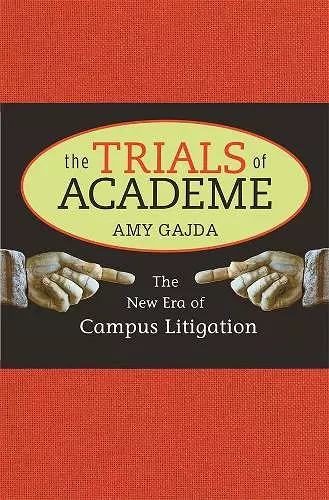The Trials of Academe
The New Era of Campus Litigation
Format:Hardback
Publisher:Harvard University Press
Published:29th Nov '09
Currently unavailable, and unfortunately no date known when it will be back

Run, do not walk, to get this book--a great read on a wonderful topic. Amy Gajda is a terrific writer, generous but with real critical bite. For all her irreverent and funny style, her case that academic decisions are increasingly out of academic hands is persuasive and provocative. -- Michael Olivas, author of The Law and Higher Education No other book tells us so much about the range of legal disputes facing the academy, and certainly not in such an engaging style, with lots of stories about real cases. Looking at disputes in such disparate areas as defamation, intellectual property, civil rights, and contract, Gajda makes a compelling argument that professors, students, and the courts have lost their traditional deference to academic judgment and principles of academic freedom. It's a valuable and fascinating history of the increasingly litigious academic climate we see today. -- Corynne McSherry, author of Who Owns Academic Work?
As Amy Gajda shows in this witty yet troubling book, litigation is now common on campus, and perhaps even more commonly feared. This book explores the origins and causes of the litigation trend, its implications for academic freedom, and what lawyers, judges, and academics themselves can do to limit the potential damage.
Once upon a time, virtually no one in the academy thought to sue over campus disputes, and, if they dared, judges bounced the case on grounds that it was no business of the courts. Tenure decisions, grading curves, course content, and committee assignments were the stuff of faculty meetings, not lawsuits.
Not so today. As Amy Gajda shows in this witty yet troubling book, litigation is now common on campus, and perhaps even more commonly feared. Professors sue each other for defamation based on assertions in research articles or tenure review letters; students sue professors for breach of contract when an F prevents them from graduating; professors threaten to sue students for unfairly criticizing their teaching.
Gajda’s lively account introduces the new duo driving the changes: the litigious academic who sees academic prerogative as a matter of legal entitlement and the skeptical judge who is increasingly willing to set aside decades of academic deference to pronounce campus rights and responsibilities.
This turn to the courts is changing campus life, eroding traditional notions of academic autonomy and confidentiality, and encouraging courts to micromanage course content, admissions standards, exam policies, graduation requirements, and peer review.
This book explores the origins and causes of the litigation trend, its implications for academic freedom, and what lawyers, judges, and academics themselves can do to limit the potential damage.
Run, do not walk, to get this book--a great read on a wonderful topic. Amy Gajda is a terrific writer, generous but with real critical bite. For all her irreverent and funny style, her case that academic decisions are increasingly out of academic hands is persuasive and provocative. -- Michael Olivas, author of The Law and Higher Education
No other book tells us so much about the range of legal disputes facing the academy, and certainly not in such an engaging style, with lots of stories about real cases. Looking at disputes in such disparate areas as defamation, intellectual property, civil rights, and contract, Gajda makes a compelling argument that professors, students, and the courts have lost their traditional deference to academic judgment and principles of academic freedom. It's a valuable and fascinating history of the increasingly litigious academic climate we see today. -- Corynne McSherry, author of Who Owns Academic Work?
[A] terrific new book. -- Stanley Fish * New York Times online *
Gajda considers how the more general litigation revolution has affected academia, with students and professors turning increasingly to the courts to resolve issues over grades, claims made in research and scholarship, teacher evaluations, etc...[A] lively, readable book. -- D. Yalof * Choice *
- Nominated for James Willard Hurst Prize 2010
- Nominated for David J. Langum, Sr. Prize in American Legal History or Biography 2009
ISBN: 9780674035676
Dimensions: unknown
Weight: unknown
360 pages